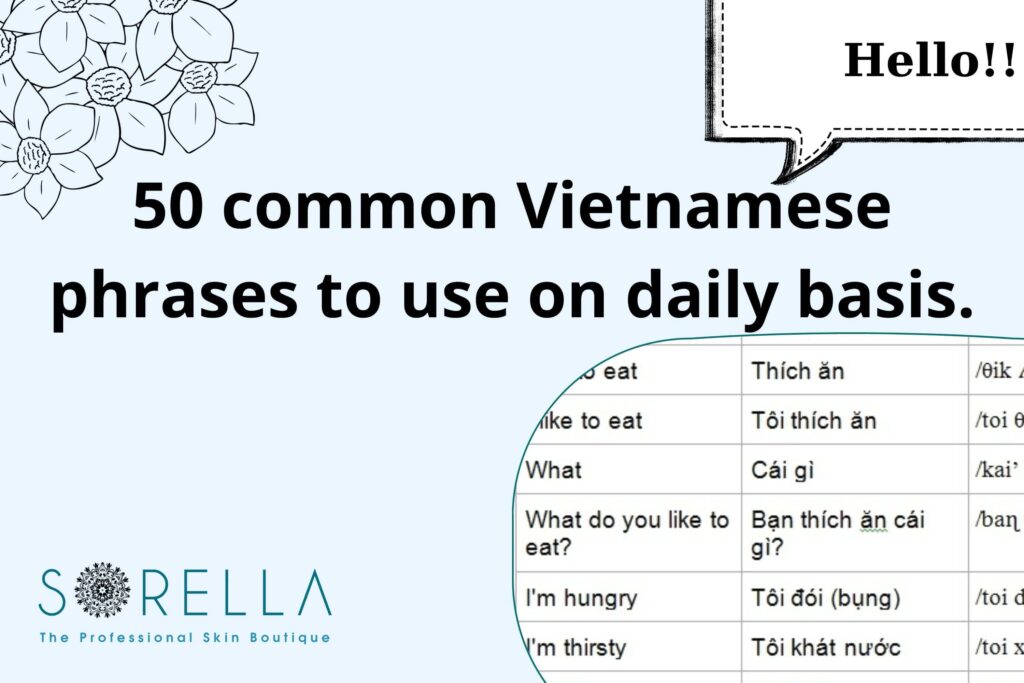Common Vietnamese phrases – While English is commonly spoken in Vietnam, particularly in major cities like Saigon and Hanoi, it’s important to note that not everyone is fluent. Mastering a few essential Vietnamese phrases is advisable for a smooth experience in your daily interactions. Here are some common Vietnamese phrases to acquaint yourself with during your stay in Vietnam.
But first, what is Vietnamese‘s mother tongue language?
The official language of Vietnam, Vietnamese, serves as the vibrant heartbeat of this enchanting country. With over 70 million native speakers and a significant number of ethnic minorities adopting it as their second language, Vietnamese holds a unique position as the sole official language in this diverse nation.
Vietnamese is not confined to a singular linguistic hue. It weaves a tapestry of diversity, harmoniously embracing dialectical variations across different regions of Vietnam. From the lyrical verses of Hue’s dialect to the rustic beauty of Northern Vietnamese, each linguistic variation paints a vivid picture of the magnificent cultural mosaic that thrives within this nation.

Vietnamese, a member of the Austroasiatic language family, finds its place among the diverse languages spoken across South and Southeast Asia, including Khmer and Mon. While rooted in its Austroasiatic origins, Vietnamese has been shaped by historical influences, particularly from Chinese and French, creating a unique linguistic tapestry.
Additionally, regional nuances in pronunciation add an intriguing layer to the language, making it a rich and dynamic means of communication.
While Vietnamese continues to evolve, it remains firmly rooted in its indigenous origins. The language celebrates the spirit of resilience and adaptation, honoring its historical influences while preserving its innate musicality and poetic expressions.
As new generations embrace the rich tapestry of influences, the Vietnamese language serves as a bridge between the past and the present, perpetuating the legacy of Vietnam’s linguistic heritage.
Common Vietnamese phrases – Phrases for greeting people
Embarking on a journey to Vietnam, whether landing in the vibrant city of Hanoi or the bustling metropolis of Ho Chi Minh, presents an opportunity to embrace the local culture through the power of language.
Equipping oneself with a few basic Vietnamese phrases not only allows for smoother interactions with drivers and immigration officers but also opens the doors to authentic conversations and deeper connections. In this report, we will explore some of the most common and essential phrases that will guide you on your language journey in Vietnam.

Xin chào (sin chow) – Hello. This is probably the thirst thing you’ll learn and hear in Vietnam. It’s always worth knowing how to say hello in the local language.
Cho tôi hỏi (cho toy hoi) – Excuse me.
Bạn tên là gì (ban tain la gi) – What’s your name?
Tôi tên là… (toy ten la) – My name is…
Bạn Khỏe không? (ban kwae kaung) – How are you?
Bạn đến từ đâu? (ban den to dough) – Where are you from?
Tôi đên từ…(toi den too) – I’m from…
Tạm biệt (tam byet) – Goodbye.
Phrases for ordering food
(Thịt) gà (teet gah) – Chicken. Thit at the beginning is optional as it means meat.
(Thịt) bò (teet baw) – Beef.
(Thịt) lợn/heo (teet lo-on/heu) – Pork.
Cá (kah) – fish
Bao nhiêu tiền (bahw ngew tee-uhn) – How much is it?
Thanh toán tiền (tain toan tee-uhn) – The check, please.
Ngon lắm (ngawn luhm) – It was delicious!
Tôi muốn đặt món này(Toy mwoon dat mown nay)
(I would like to order this dish.)

Cho tôi một ly nước lạnh(Cho toy mowt lee noo-uck lahnh)
(Give me a glass of cold water.)
Xin cho tôi một phần phở(Sin cho toy mowt fuhn fuh)
(Please give me a bowl of pho.)
Tôi muốn gọi một dĩa bánh xèo, xin cảm ơn(Toy mwoon goy mowt yah bahn say-oh, sin kahm uhn)
(I would like to order a plate of banh xeo, please.)
Có món gì ngon bạn có thể gợi ý không? (Gaw mown yi ngawn ban caw tay gaw ee khong?)
(Is there any dish you can recommend me?)
Tôi muốn thử món ăn đặc sản của vùng này. (Toy mwoon tsoo mown un dack sun cwah voong nay)
(I would like to try the local specialty dish.)
Cho tôi một ly sinh tố trái cây, xin cảm ơn. (Cho toy mowt lee sing tur try kai, sin kahm uhn)
(I would like a glass of smoothie, pls.)
Có món này không? (Gaw mown nay khong?)
(Do you have this dish?)
Tôi không ăn thịt, bạn có một món chay không? (Toy khong un tit, ban caw mowt mown chay khong?)
(I can’t eat meat, do you have vegan food?)
Tính tiền. (Ting teen) (Please bring the bill)
Phrase for aksing for direction
“Xin lỗi, tôi muốn hỏi đường đi đến _____.” (Sin loi, toy mwoon hoi doong dee den _____.)
(Excuse me, I would like to ask for directions to _____.)
Phrase for daily use
Dạ (zah) – Yes.
Không (kaung) – No.
Cảm ơn (cam uhn) – Thank you.
Không, cảm ơn (kaung cam uhn) – No, thank you.
Xin lỗi (sin loy) – I’m sorry. It can be used both for apologizing or getting someone’s attention by saying excuse me.
Làm ơn (lam uhn) – Please.
Không sao đâu (kaung sao dou) – You’re welcome.
Phrase for emergency issues
Cứu (tôi) với (gih-oo (thoy) vuh-y) – Help me.
Biết nói tiếng Anh không (byet noy tyeng ang kaumng) – Do you speak English?
Tôi không hiểu (toi kaung heeyau) – I don’t understand.
Tôi không biết nói tiếng Việt (toi kaung byet noy tyeng vyet) – I can’t speak Vietnamese.
Nhà vệ sinh ở đâu? (na ve sing uh doh) – Where is the toilet?
Tôi bị lạc (toi bee lack) – I’m lost.
Tôi cần một bác sĩ (toy kuhn moht back see) – I need a doctor.
Numbers in Vietnamese
một (moth) – one
hai (high) – two
ba (bah) – three
bốn (bone) – four
năm (nuhm) – five
sáu (sao) – six
bảy (bye) – seven
tám (tahm) – eight
chín (cheen) – nine
mười (meui) – ten
một trăm (moht cham) – 100
Is vietnamese hard to study
Vietnamese is indeed considered a challenging language for native English speakers due to its tonal nature. The meaning of a word in Vietnamese can change based on the tone used when pronouncing it. There are six different tones in Vietnamese, which can be difficult to grasp for non-native speakers.
Mastering the correct pronunciation and tones in Vietnamese requires consistent practice and exposure to the language. Classroom textbooks alone may not be sufficient in helping learners acquire the necessary skills to understand and communicate effectively in Vietnamese. Immersion in the language and learning from native speakers can greatly enhance learning.
That being said, while it can be challenging, learning Vietnamese can also be a rewarding experience. As with any language, dedication, practice, and exposure to native speakers will greatly improve pronunciation and understanding over time.
Here are some articles on Sorella Beauty you may like:
Embark on a Journey to 12 Enchanting Destinations Near Hanoi
Top 10 pubs in Hanoi that capture the hearts of the youth
Massage Therapy: All You Need to Know in 2023
12 Things You Should Know About Laser Hair Removal Before Getting It
A Step-by-Step Guide to Eyelash Extensions 2023
- DETOX ACNE TREATMENT for INFLAMED PORES at SORELLA BEAUTY & SPA: Essential 5+ Steps
- HAIR REMOVAL Service at SORELLA BEAUTY & SPA: Essential 5+ Steps
- Details of PREMIUM AQUA PEEL facial care service of Sorella Beauty & Spa
- Details of PREMIUM RECOVERY SKIN facial care service of Sorella Beauty & Spa
- Simplest skincare routines for men and 6 skincare tips


 Tiếng Việt
Tiếng Việt 中文 (中国)
中文 (中国) 한국어
한국어

